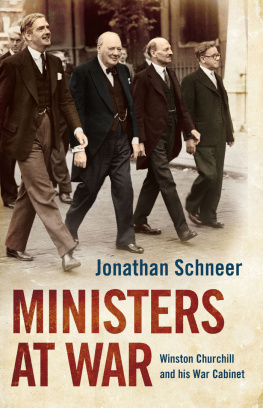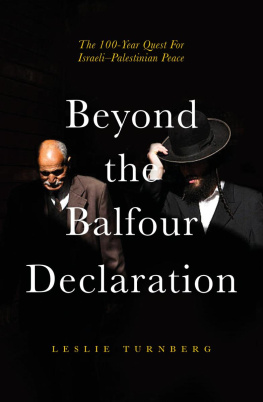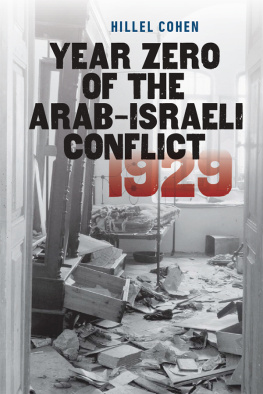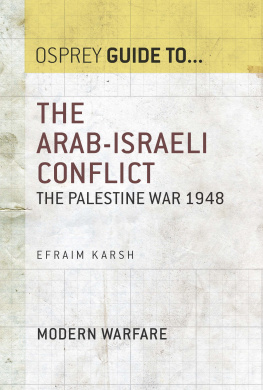Jonathan Schneer - The Balfour Declaration: The Origins of the Arab-Israeli Conflict
Here you can read online Jonathan Schneer - The Balfour Declaration: The Origins of the Arab-Israeli Conflict full text of the book (entire story) in english for free. Download pdf and epub, get meaning, cover and reviews about this ebook. year: 2010, publisher: Random House, genre: Politics. Description of the work, (preface) as well as reviews are available. Best literature library LitArk.com created for fans of good reading and offers a wide selection of genres:
Romance novel
Science fiction
Adventure
Detective
Science
History
Home and family
Prose
Art
Politics
Computer
Non-fiction
Religion
Business
Children
Humor
Choose a favorite category and find really read worthwhile books. Enjoy immersion in the world of imagination, feel the emotions of the characters or learn something new for yourself, make an fascinating discovery.

- Book:The Balfour Declaration: The Origins of the Arab-Israeli Conflict
- Author:
- Publisher:Random House
- Genre:
- Year:2010
- Rating:3 / 5
- Favourites:Add to favourites
- Your mark:
- 60
- 1
- 2
- 3
- 4
- 5
The Balfour Declaration: The Origins of the Arab-Israeli Conflict: summary, description and annotation
We offer to read an annotation, description, summary or preface (depends on what the author of the book "The Balfour Declaration: The Origins of the Arab-Israeli Conflict" wrote himself). If you haven't found the necessary information about the book — write in the comments, we will try to find it.
The Balfour Declaration: The Origins of the Arab-Israeli Conflict — read online for free the complete book (whole text) full work
Below is the text of the book, divided by pages. System saving the place of the last page read, allows you to conveniently read the book "The Balfour Declaration: The Origins of the Arab-Israeli Conflict" online for free, without having to search again every time where you left off. Put a bookmark, and you can go to the page where you finished reading at any time.
Font size:
Interval:
Bookmark:
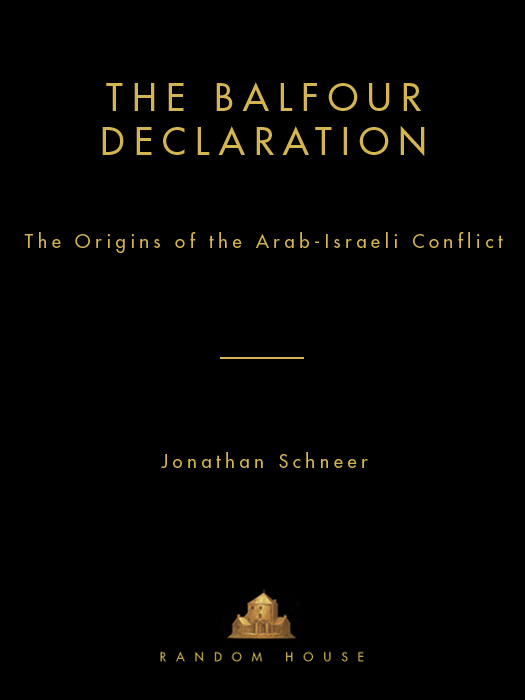
Ben Tillett: Portrait of a Labour Leader
Labours Conscience: The Labour Left, 194551
George Lansbury
London 1900
The Thames
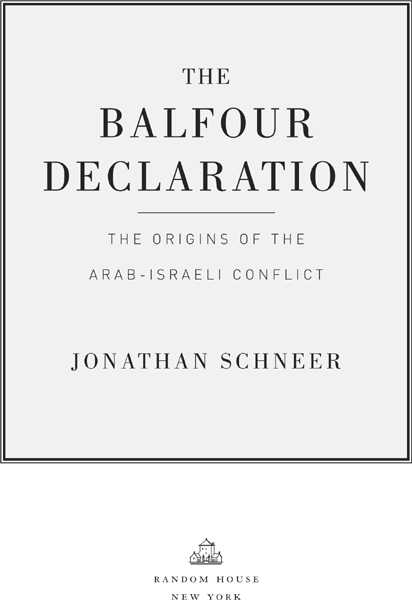
This book is dedicated in loving memory to my parents.
In his indignation Cadmus killed the dragon, and by the advice of Athena sowed its teeth. When they were sown there rose from the ground armed men.
APOLLODORUS 3.4.1
(Transl. J. G. Frazer)
PART I
CHAPTER 1
CHAPTER 2
CHAPTER 3
CHAPTER 4
CHAPTER 5
CHAPTER 6
CHAPTER 7
PART II
CHAPTER 8
CHAPTER 9
CHAPTER 10
CHAPTER 11
PART III
CHAPTER 12
CHAPTER 13
CHAPTER 14
CHAPTER 15
CHAPTER 16
PART IV
CHAPTER 17
CHAPTER 18
CHAPTER 19
CHAPTER 20
CHAPTER 21
PART V
CHAPTER 22
CHAPTER 23
CHAPTER 24
CHAPTER 25
CHAPTER 26
(These brief notes are meant to provide only the most basic relevant information for those reading this book.)
AARONSOHN, AARON 18761919
He gained fame as the foremost agronomist in Palestine before World War I, but is best known for putting his knowledge of the land to use for Britain during the war and for his Zionist activities. He perished in an airplane crash.
ABDULLAH IBN HUSSEIN 18821951
Second son of Sharif Hussein, a member of the prewar Ottoman parliament, he helped to instigate and then took a leading role in the Arab Revolt. After the war he became emir of Transjordan, and when the British mandate ended in 1946, he became king of Transjordan and then in 1949 king of the Hashemite Kingdom of Jordan. He died by assassination.
ALI IBN HUSSEIN 18791935
First son of Sharif Hussein, he did not play a leading role in the Arab Revolt but nevertheless succeeded his father as king of the Hejaz in 1924, when the Wahhabi rebellion occurred. He abdicated one year later and spent the rest of his life in Baghdad in Iraq, where his brother Feisal ruled as king.
ALLENBY, SIR EDMUND 18611936
Promoted to general for his services on the Western Front, he took command of the British-led Egyptian Expeditionary Force in June 1917. His forces captured Gaza in October, Jerusalem in December, and Damascus in October 1918. He served as high commissioner for Egypt from 1919 to 1925.
ASQUITH, HERBERT HENRY
(FIRST EARL OF OXFORD AND ASQUITH) 18521928
The Liberal politician who served as prime minister from 1908 to 1916, he led Britain into the war and in May 1915 formed a coalition government with the Conservatives. Lloyd George replaced him as prime minister in December 1916.
AUDA ABU TAYI 18851924
The leader of a section of the Howeitat tribe of Bedouin Arabs, he threw his support behind the Arab Revolt and with Lawrence engineered the capture of Aqaba. Lawrence called him the greatest fighting man in northern Arabia.
BALFOUR, ARTHUR JAMES (FIRST EARL OF BALFOUR) 18481930
The Conservative prime minister from 1902 to 1905, he served on Asquiths war council from the outbreak of hostilities until formation of the coalition government, upon which Asquith appointed him first lord of the Admiralty. When Lloyd George formed the second coalition government, he appointed Balfour to be his foreign secretary. After the war Balfour served in the Lloyd George government as lord president of the council.
CAILLARD, SIR VINCENT 18561930
A businessman with wide interests and direct experience of Turkey and the Ottoman Middle East, he served as financial director of Vickers armaments manufacturers from 1906 until after the war. In the attempt to arrange a separate peace with the Ottomans, he played the role of intermediary between Basil Zaharoff and David Lloyd George.
CECIL, ROBERT (FIRST VISCOUNT CECIL OF CHELWOOD) 18641958
Son of Prime Minister Lord Salisbury, cousin of Arthur Balfour, and himself a Conservative member of Parliament (although a free trader), he joined Asquiths coalition government in 1915 as parliamentary under secretary of state for foreign affairs, a post he held for four years. After the war he devoted himself to work for the League of Nations and international peace.
CHEETHAM, SIR MILNE 18691938
A career diplomat, after numerous postings he arrived in Cairo as first secretary to the British high commissioner. During the interval between Kitcheners departure in June 1914 and McMahons arrival in January 1915, he served as acting high commissioner and helped compose an early letter to Grand Sharif Hussein.
CLAYTON, SIR GILBERT 18751929
Before the war he served Sir Reginald Wingate, governor general of Sudan, as director of intelligence in Sudan and agent in Cairo. With the outbreak of war he became director of military intelligence at British headquarters in Cairo, head of the Arab Bureau, and eventually chief political officer of the Egyptian Expeditionary Force and military governor of Palestine. After the war he continued to play an active role in Middle Eastern affairs, but his career was cut short by a fatal heart attack.
CURZON, NATHANIEL
(FIRST MARQUESS CURZON OF KEDLESTON) 18591925
A Conservative politician who had served as viceroy of India from 1898 to 1905, he joined Asquiths coalition government as lord privy seal in 1915. Lloyd George tapped him for his own coalition government a year and a half later, and for membership of the select War Cabinet, in which he served as lord president of the council. After the war Curzon replaced Balfour as foreign secretary and served until the Labour victory in the general election of 1923.
DJEMAL PASHA 18721922
An Ottoman military officer and early supporter of the CUP, he and Enver and Talaat effectively ruled the empire from 1913 until the end of the war. During 1915 and again in 1916 he led the Ottoman Fourth Army in unsuccessful attacks against British forces at Suez. Throughout the war he exercised dictatorial powers in Syria, earning widespread hatred. Afterward he fled to Germany, then to Switzerland, and finally to Central Asia. He was assassinated by an Armenian revolutionary.
ENVER PASHA 18811922
An Ottoman military officer and early supporter of the CUP, he was the architect of the triumvirate of three pashas who ruled the empire during 191318 and of the governments pro-German policy. During the war he occupied the position of war minister, although he was generally an unsuccessful military leader. With the Ottoman defeat in 1918, he fled first to Germany and eventually to the Soviet Union. An advocate of pan-Turanianism, he died fighting the Russians in Central Asia.
FARUKI, SHARIF MUHAMMAD AL-18911920
A young Arab staff officer and member of the secret society al-Ahd, he crossed over to the British lines at Gallipoli, hoping to convince them to support Sharif Husseins revolt and the Arabian kingdom adumbrated in the Damascus Protocol. He did so, although he did not formally represent al-Ahd. Later he became Sharif Husseins agent in Cairo.
Font size:
Interval:
Bookmark:
Similar books «The Balfour Declaration: The Origins of the Arab-Israeli Conflict»
Look at similar books to The Balfour Declaration: The Origins of the Arab-Israeli Conflict. We have selected literature similar in name and meaning in the hope of providing readers with more options to find new, interesting, not yet read works.
Discussion, reviews of the book The Balfour Declaration: The Origins of the Arab-Israeli Conflict and just readers' own opinions. Leave your comments, write what you think about the work, its meaning or the main characters. Specify what exactly you liked and what you didn't like, and why you think so.

